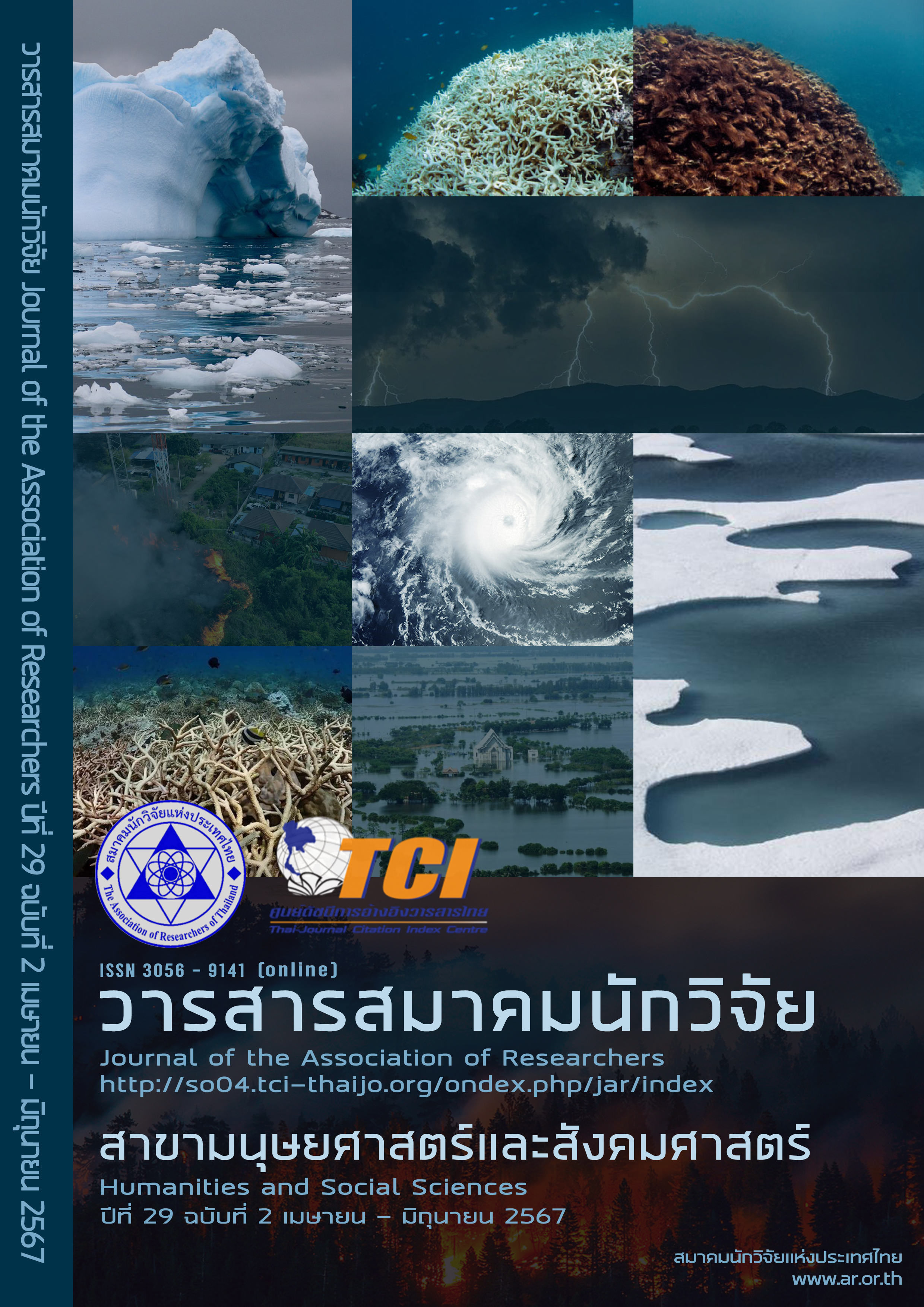Global Warming: A Severe Threat Driven by Industrial Era
Main Article Content
Abstract
The current state of global warming has escalated to the point where it has significantly altered the Earth's climate, leading to extreme weather events. These events include heatwaves, prolonged droughts, rampant wildfires, sudden heavy rainfall, and intense storms, all of which pose severe threats to natural ecosystems and human survival. In light of these developments, this article aims to present knowledge about global warming in three main aspects: 1) Causes of global warming problems, 2) Effects of global warming problems, and 3) Guidelines for solving global warming problems. Research findings indicate that the primary cause of global warming stems from human activities, particularly industrial processes that emit various greenhouse gases, notably carbon dioxide. These gases act as the main drivers of the problem by disrupting the natural balance of the atmosphere, leading to an excessive greenhouse effect. Consequently, the Earth's surface temperature has risen abnormally, resulting in global warming. The impacts of global warming are evident in changes to the climate and rapid melting of polar ice, which, in turn, contribute to various crises threatening all forms of life. Mitigation strategies involve reducing carbon dioxide emissions into the atmosphere and eliminating sources of carbon dioxide emissions, which would alleviate the severity of global warming and foster sustainable societies.
Article Details

This work is licensed under a Creative Commons Attribution-NonCommercial-NoDerivatives 4.0 International License.
บทความที่ปรากฏในวารสารนี้ เป็นความรับผิดชอบของผู้เขียน ซึ่งสมาคมนักวิจัยไม่จำเป็นต้องเห็นด้วยเสมอไป การนำเสนอผลงานวิจัยและบทความในวารสารนี้ไปเผยแพร่สามารถกระทำได้ โดยระบุแหล่งอ้างอิงจาก "วารสารสมาคมนักวิจัย"
References
Betts, R.A., Jones, C.D., Knight, J.R., Pope, J.O. and Sandford,C. (2024). Mauna Loa carbon dioxide forecast for 2024. Retrieved from https://www.metoffice.gov.uk/research/climate/ seasonal-to-decadal/long-range/forecasts/co2-forecast.
Buis, A. (2019). The Atmosphere: Getting a Handle on Carbon Dioxide. Retrieved from
Center for Sustainable Systems, University of Michigan. (2023). Climate Change: Science and Impacts. Retrieved from https://css.umich.edu/sites/default/files/2023-10/Climate% 20Science_CSS05-19_0.pdf
Climate Trade. (2023). Top 10 countries leading the world’s decarbonization. Retrieved from https://climatetrade.com/top-10-countries-leading-the-worlds-decarbonization/.
Climate Central. (2024). 2023: Earth’s Hottest Year on Record. Retrieved from https://www.climatecentral.org/climate-matters/2023-earths-hottest-year-on-record.
Copernicus. (2024). Copernicus: 2023 is the hottest year on record, with global temperatures close to the 1.5°C limit. Retrieved from https://climate.copernicus.eu/copernicus-2023-hottest-year-record.
Cowing, K. (2023). Arctic Sea Ice 6th Lowest on Record; Antarctic Sees Record Low Growth. Retrieved from https://spaceref.com/earth/arctic-sea-ice-6th-lowest-on-record-antarctic-sees-record-low-growth/
Hafeez, S and Win, T.L. (2023). For Pakistan flood victims, crises collide to fuel growing hunger.
Retrieved from https://www.preventionweb.net/news/pakistan-flood-victims-crises-collide-fuel-growing-hunger.
Hinkle Charitable Foundation. (n.d.). Report 3: How do Greenhouse Gases Cause Global Warming?. Retrieved from https://www.thehcf.org/report-3-how-do-greenhouse-gases cause-global-warming.
Lindsey, R. and Dahlman, L. (2024). Climate Change: Global Temperature. Retrieved from https://www.climate.gov/news-features/understanding-climate/climate-change-global-temperature.
Loria, K. (2018). CO2 levels in atmosphere are at their highest in 800,000 years. Retrieved from https://www.weforum.org/agenda/2018/05/earth-just-hit-a-terrifying-milestone-for-the-first-time-in-more-than-800-000-years/.
Ma, Q. (1998). Greenhouse Gases: Refining the Role of Carbon Dioxide. Retrieved from
https://www.giss.nasa.gov/research/briefs/archive/1998_ma_01/.
Macnamara, K. (2022). Spain, Portugal dryness 'unprecedented' in 1,200 years. Retrieved from https://phys.org/news/2022-07-spain-portugal-dryness-unprecedented-years.html.
Mersmann, K. (2023). Arctic Sea Ice 6th Lowest on Record; Antarctic Sees Record Low Growth. Retrieved from https://www.nasa.gov/centers-and-facilities/goddard/arctic-sea-ice-6th-lowest-on-record-antarctic-sees-record-low-growth/
Min, R. (2023). Sweden is building the world's first permanent electrified road for EVs to charge while driving. Retrieved from https://www.euronews.com/next/2023/05/09/ sweden-is-building-the-worlds-first-permanent-electrified-road-for-evs-to-charge-while-dri
Ming, A., Rowell, I., Lewin, S., Rouse, R., Aubry, T.J. & Boland, E.J.D. (2021) Key messages from the IPCC AR6 climate science report. Retrieved from https://www.cambridge.org/ engage/api-gateway/coe/assets/orp/ resource/item/ 617a83eb45f1eea41b40a461 /original/key-messages-from-the-ipcc-ar6-climate-science-report.pdf
National Snow and Ice Data Center. (2023). The long Arctic winter sets in. Retrieved from https://nsidc.org/arcticseaicenews/2023/11/the-long-arctic-winter-sets-in/
Nixon, D. (2024). 2023: a record-breaking year for global climate change. Retrieved from https://wildfish.org/blog/2023-a-record-breaking-year-for-global-climate-change/
Pultarova, T. (2021). Siberian wildfires double greenhouse gas emission record: This is how they look from space. Retrieved from https://www.space.com/siberia-wildfires-greenhouse-gas-emissions-satellite-images
Rasmussen, C. E. (2024). Atmospheric Carbon Dioxide Growth Rate. Retrieved from https://mlg.eng.cam.ac.uk/carl/words/carbon.html.
Reuters. (2021). World’s larght plant capturing carbon from air starts in Iceland. Retrieved from https://www.reuters.com/business/environment/worlds-largest-plant-capturing-carbon-air-starts-iceland-2021-09-08/
Richardson, A. J. (2008). In hot water: zooplankton and climate change. Retrieved from file:///C:/Users/com/Downloads/In_hot_water_Zooplankton_and_climate_change-1.pdf
Roger Williams University. (n.d.). 8.1 Earth’s Heat Budget – Introduction to Oceanography. Retrieved from http://rwu.pressbooks.pub/webboceanography/chapter/8-1-earths-heat-budget/
Roston, E. (2021). CO2 reaches its highest level in more than 4 million years. Retrieved from https://phys.org/news/2021-06-co2-highest-million-years.html
Salas, E. B. (2023). Global disaster risk index 2023, by select country. Retrieved from https://www.statista.com/statistics/1270469/disaster-risk-index-most-affected-countries/.
Salas, E. B. (2024). Global land and ocean temperature anomalies 1880-2023. Retrieved from https://www.statista.com/statistics/224893/land-and-ocean-temperature-anomalies-based-on-temperature-departure/.
Salas, E. B. (2024). Global mean sea level change 1993-2023. Retrieved from
https://www.statista.com/statistics/603821/global-cumulative-sea-level-rise/
Sengupta, R and Pandey, K. (2019). World breached safe atmospheric CO2 levels 33 years ago. Retrieved from https://www.downtoearth.org.in/news/environment/world-breached-safe-atmospheric-co2-levels-33-years-ago-64546.
Smith-Schoenwalder, C. (2023). Extreme Heat Wave Hits U.S., Europe and Asia, Dashing Records. Retrieved from https://www.usnews.com/news/national-news/articles/ 2023-07-18/extreme-heat-wave-hits-u-s-europe-and-asia-dashing-records
The Guardian. (2024). Devastating drought in Amazon result of climate crisis, study shows. . Retrieved from https://www.theguardian.com/environment/ 2024/jan/24/devastating-drought-in-amazon-result-of-climate-crisis-study-shows
Tiseo, I. (2023). Global greenhouse gas emissions 1970-2022. Retrieved from https://www.statista.com/statistics/1285502/annual-global-greenhouse-gas-emissions/#:~:text=Global%20greenhouse%20gas%20(GHG)%20emissions,by%20more%20than%2060%20percent
Tiseo, I. (2024). Global cumulative CO₂ emissions from fossil fuels and land use 1850-2022, by country. Retrieved from https://www.statista.com/statistics/1267683/cumulative-co2-emissions-fossil-fuel-land-use-forestry-worldwide-by-country/.
World Economic Forum. (2022). Here’s how heat waves can impact economies, as well as people and wildlife. Retrieved from https://www.weforum.org/ agenda/2022/07/heat-waves-economy-climate-crisis/
World Meteorological Organization. (2023). 2023 shatters climate records, with major impacts. Retrieved from https://wmo.int/news/media-centre/2023-shatters-climate-records-major-impacts.
World Meteorological Organization. (2023). Greenhouse Gas concentrations hit record high. Again. Retrieved from https://wmo.int/news/media-centre/greenhouse-gas-concentrations-hit-record-high-again.
World Meteorological Organization. (2024). Climate change indicators reached record levels in 2023: WMO. Retrieved from https://wmo.int/news/media-centre/climate-change-indicators-reached-record-levels-2023-wmo#:~:text=The%20WMO%20report% 20confirmed%20that,ten%2Dyear%20period%20on%20record.
Young, A. (2022). Earth's CO2 Level Rose Every Year Since Climate Change Became a National Issue. Retrieved from https://247wallst.com/special-report/2022/08/07/earths-co2-level-rose-every-year-since-climate-change-became-a-national-issue/.


